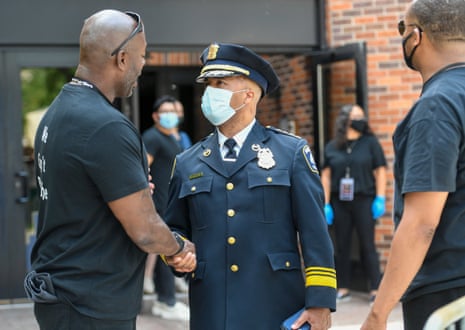The Minneapolis police department announced on Wednesday that it would withdraw from police union contract negotiations. The department’s chief said the contract needs to be restructured to provide more transparency and flexibility for true reform.
“This is not about officers’ wages, bonuses or salaries,” the department chief, Medaria Arradondo, said at presser conference announcing the withdrawal. The move is considered the first step toward transformational reforms to the embattled agency in the wake of George Floyd’s death last month.
Minneapolis Police Chief Medaria Arradondo affirms power and importance of recording police misconduct. Says it’s critical for the public to record, to call out, to demand a supervisor report to the scene. #Minneapolis
— Kristen Clarke ☎️866-OUR-VOTE (@KristenClarkeJD) June 10, 2020
“This is about examining those significant matters that touch on things such as critical incident protocol, use of force, the significant role that supervisors play in this department, and also the discipline process to include both grievances and arbitration.”
Arradondo planned to bring in outside experts to examine how the contract with the Police Officers Federation can be restructured to provide transparency and “flexibility for true reform”.
The Minneapolis mayor, Jacob Frey, confirmed barriers to police discipline earlier this week, telling ABC News on Monday that the city has difficulty terminating and disciplining officers because of the police union. Arradondo confirmed on Wednesday that it can be debilitating for a chief when there are grounds to terminate an officer and a third-party mechanism works to keep that person on the street.
“This work must be transformational, but I must do it right,” he said of reforms. Arradondo also promised new research and strategies to spot and intervene with problem officers.
Arradondo is Minneapolis’s first African American police chief, joining the department in 1989 as a patrol officer and eventually working his way up to precinct inspector, then head of the internal affairs unit.
Asked about the apparent "rookie" defense by two officers charged in the death of George Floyd, the Minneapolis police chief says the community expects officers to serve honorably, whether they've been a cop for 2 days or 20 years. pic.twitter.com/Dl9md2p5rJ
— Josh Campbell (@joshscampbell) June 10, 2020
In that role, he investigates officer misconduct allegations. Along the way, he and four other black officers successfully sued the department for discrimination in promotions, pay and discipline. Through reforms, he vowed that the department would address issues of racism head-on.
“We will have a police department that our communities view as legitimate, trusting and working with their best interests at heart,” he said.
George Floyd died on 25 May when a 19-year veteran of the department, Derek Chauvin, forcibly kept his knee in Floyd’s neck, ignoring pleas for help and cries of “I can’t breathe” for more than eight minutes.
Chauvin had 17 complaints against him and was only disciplined once, according to a database by Minneapolis’s Communities United Against Police Brutality. He is now charged with second-degree murder and manslaughter.
Three other officers at the scene are charged with aiding and abetting the second-degree murder and manslaughter counts.
When asked if Bob Kroll, a police lieutenant and the union’s president, needs to step down, Arradondo dodged the question, instead responding that he had been in communication with Kroll and that there were “going to have to be some decisions made”.
Frey had previously opposed abolishing the police department, garnering him boos from a crowd of protesters. However, he has said he favors a shift in department culture when it came to community and race relations.
Reporting contributed by the Associated Press
